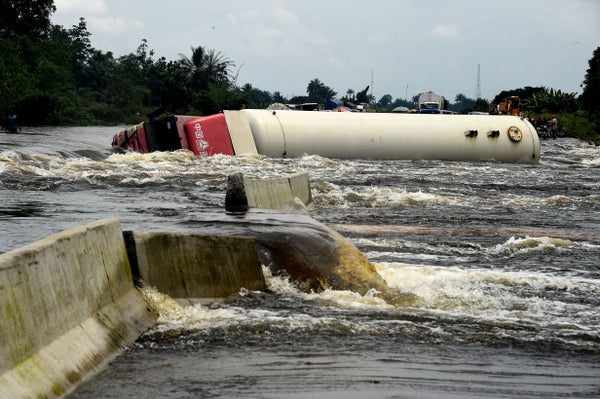Extreme rainfall in Nigeria triggered catastrophic floods this summer that killed hundreds and displaced more than a million people. A new study finds that the influence of global warming made the downpours 80 times more probable.
It’s the latest report from the international research consortium World Weather Attribution, which specializes in the links between climate change and extreme weather events. So far this year, the organization has identified the fingerprints of global warming in deadly flooding in Pakistan and extreme heat in the United Kingdom.
The new analysis examines a series of devastating floods in the West African nations of Niger, Nigeria, Chad, Cameroon and Benin that killed at least 800 people. Authorities estimate that more than 3 million people were affected by the disasters, with around 1.5 million being displaced from their homes.
On supporting science journalism
If you're enjoying this article, consider supporting our award-winning journalism by subscribing. By purchasing a subscription you are helping to ensure the future of impactful stories about the discoveries and ideas shaping our world today.
The floods were triggered by an early and unusually severe monsoon season. Experts say water released from several dams, including the Lagdo Dam in Cameroon and the Tiga Dam in Nigeria, likely contributed to the inundations.
The World Weather Attribution team used a combination of observations and climate model simulations to investigate the influence of climate change on the floods. It examined two key metrics. It first looked at the average seasonal rainfall across the entire Lake Chad region. Next, it focused on the wettest seven-day period in the lower Niger River Basin, where some of the worst floods were recorded.
The heaviest seven days, the team found, were probably about twice as likely to happen because of the influence of climate change. The entire summer’s average rainfall, on the other hand, was probably about 80 times more likely. The rains were also likely around 20 percent more intense than they would have been without the influence of global warming.
These kinds of events have grown more frequent as the planet has warmed. In fact, they’re no longer rare. In any given year, the region has a 1-in-10 chance of a disaster on the order of this summer’s floods.
Models suggest that these kinds of events may worsen at a slightly slower pace in this part of Africa over the coming decades than they did over the last 30 years. But they’ll still continue to intensify as the world keeps warming.
Meanwhile, much of the same region of Africa is currently gripped by a food security crisis, according to a separate World Weather Attribution analysis. West Africa’s monsoon season often varies dramatically from one year to the next. And in contrast to this summer’s early and intense monsoons, the summer of 2021 brought an “erratic rainy season” with short, delayed monsoons.
Crop production across the region dropped precipitously as a result, falling by as much as 36 percent in Niger and 10 percent in Burkina Faso. Other global events, like the continuing Covid-19 pandemic and falling wheat imports as a result of Russia's war in Ukraine, have worsened the situation.
The analysis did not identify a significant fingerprint of climate change in last year’s patchy rainfall. That doesn’t mean warming had no influence at all — there’s a shortage of reliable meteorological data across the region, making it difficult to assess observations and reconstruct them with climate models. As a result, the research team couldn’t say for sure whether warming played a role in last summer’s water shortages.
Still, the food crisis points to the region’s increasing vulnerability to shocks from extreme weather events, which are expected to worsen as global temperatures continue to climb.
Both studies were released as representatives from nations around the world are gathered in Egypt for the annual U.N. climate conference. A major topic at the meeting is climate-related loss and damage, with developing nations calling for wealthier countries to financially compensate them for the destruction that climate change is causing.
Disasters like the recent events in West Africa demonstrate the urgency of climate aid for the nations that are suffering the worst consequences of climate change, Maarten van Aalst, director of the Red Cross Red Crescent Climate Centre and a co-author of both studies, said in a statement.
“A common thread between both of our studies is that the impacts of extreme weather events and climate change are far worse in contexts of high vulnerability,” he said.
Reprinted from E&E News with permission from POLITICO, LLC. Copyright 2022. E&E News provides essential news for energy and environment professionals.
